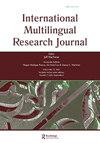How equally do teachers distribute their attention across students classified as English learners (ELs) and their non-EL peers in science classrooms? A frequency analysis of monolingual and bilingual teachers’ interactions with different student grouping configurations
IF 2.1
1区 文学
Q2 EDUCATION & EDUCATIONAL RESEARCH
引用次数: 0
Abstract
We address the notion that different student grouping configurations in the classroom may provide different sets of opportunities for English learners (ELs) – students whose home language is not En...在科学课堂上,教师如何在被归类为英语学习者(EL)的学生和非英语学习者(EL)的学生之间平等地分配他们的注意力?对单语和双语教师与不同学生分组配置互动的频率分析
我们认为,课堂上不同的学生分组配置可以为英语学习者(ELs)--母语不是英语的学生--提供不同的学习机会。
本文章由计算机程序翻译,如有差异,请以英文原文为准。
求助全文
约1分钟内获得全文
求助全文
来源期刊
CiteScore
4.10
自引率
4.80%
发文量
19
期刊介绍:
The International Multilingual Research Journal (IMRJ) invites scholarly contributions with strong interdisciplinary perspectives to understand and promote bi/multilingualism, bi/multi-literacy, and linguistic democracy. The journal’s focus is on these topics as related to languages other than English as well as dialectal variations of English. It has three thematic emphases: the intersection of language and culture, the dialectics of the local and global, and comparative models within and across contexts. IMRJ is committed to promoting equity, access, and social justice in education, and to offering accessible research and policy analyses to better inform scholars, educators, students, and policy makers. IMRJ is particularly interested in scholarship grounded in interdisciplinary frameworks that offer insights from linguistics, applied linguistics, education, globalization and immigration studies, cultural psychology, linguistic and psychological anthropology, sociolinguistics, literacy studies, post-colonial studies, critical race theory, and critical theory and pedagogy. It seeks theoretical and empirical scholarship with implications for research, policy, and practice. Submissions of research articles based on quantitative, qualitative, and mixed methods are encouraged. The journal includes book reviews and two occasional sections: Perspectives and Research Notes. Perspectives allows for informed debate and exchanges on current issues and hot topics related to bi/multilingualism, bi/multi-literacy, and linguistic democracy from research, practice, and policy perspectives. Research Notes are shorter submissions that provide updates on major research projects and trends in the field.

 求助内容:
求助内容: 应助结果提醒方式:
应助结果提醒方式:


